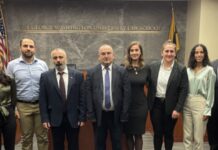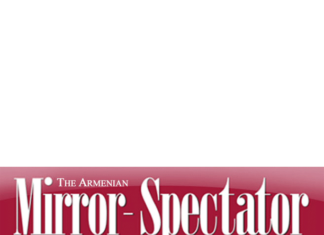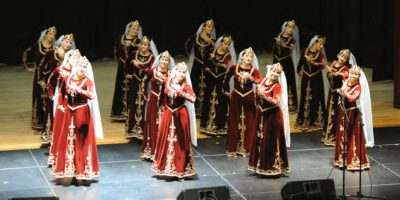By Edmond Y. Azadian
The aftermath of World War I and the formation of the Turkish Republic in 1923 on the ruins of the collapsed Ottoman Empire left behind a huge baggage of political, social and ethnic problems which were kept under wraps from the world at large through bloodshed and terror by successive Turkish administrations.
Ever since the digital era began undermining authoritarian rules around the globe and at the same time Turkey’s desire to join the European Union increased, those problems gradually bobbed to the surface, forcing Turkish leaders to deal with them in an awkward fashion.
The bloody legacy of the Armenian Genocide, Kurdish aspirations for autonomy and independence were erased and rewritten in the fake history manufactured by Ataturk to endow his country with a new image.
A country aspiring to join the civilized family of nations could no longer sweep that legacy of problems under the rug.
Two Turkish leaders have emerged very much reminiscent of Miguel de Cervantes’ immortal characters of Don Quixote and Sancho Panza, the first one blundering the issues and the latter putting the pieces together. Indeed, Recep Tayyip Erdogan and Ahmet Davutoglu, president and prime minister, respectively, have been engaged in politics to replicate Cervantes’ heroes, and many governments and statesmen take them seriously because of Turkey’s strategic position, both geopolitically and in world affairs.
Armenians and Kurds are at the receiving end of this charade to prove their cases and to make their voices heard around the world.
As Turkey has set into motion its well-oiled PR machine to fight the recognition of the Armenian Genocide, it has also enlisted the support of the captive local Armenian community to serve its political ends.
While Mr. Erdogan plays the bully, trying to intimidate Armenians and Kurds, Mr. Davutoglu has been assigned to the more delicate responsibility of complementing his master’s initiatives using kid gloves.
As if it were not enough for Mr. Erdogan to stage the Gallipoli fiasco, inviting more derision, he reiterated his hallmark denial by challenging Armenians in a recent Istanbul speech to come up with more documentary evidence: “How many documents do you have? Bring your documents and we will task the historians, political scientists, even archeologists and lawyers.”
After the verdicts of the 1919 military tribunals in Istanbul, after the proclamation of 120 respected genocide scholars headed by Elie Wiesel in a 2000 edition of the New York Times, Mr. Erdogan’s knowledge of history is lagging a full century behind.
Armenians did not need to counter this outrageous statement. Instead, Turkey’s Today’s Zaman newspaper wrote in response to this challenge: “This position is backed by many Western historians specializing in research of crimes against humanity. … A historical record on the Armenian Genocide is unambiguous and documented by overwhelming evidence,” the US-based International Association of Genocide Scholars said in a 2007 letter to members of the US Congress. “It is proven by Foreign Office records of the United States, Frances, Great Britain, Germany and Austria-Hungary, as well as by the records of the Ottoman Courts-Martial of 1918-1920, and by decades of scholarship.”
While Armenia’s President Serge Sargisian characterized the Gallipoli centennial and invitation to Armenians to attend as a “cynical ploy,” another question begs for an answer. The argument for inviting Armenians to Gallipoli is that Armenian soldiers drafted into the Ottoman army fought side-by-side with the Turks. But the irony is that even the families of those soldiers, who put their lives in harm’s way for the defense of the Ottoman homeland, found their families slaughtered as well. While the gist of Turkish justification for the genocide is that Armenians sympathized with Russia and “betrayed” the Ottoman government, the fact that even the families of Armenian soldiers fighting in Gallipoli were not spared proves unequivocally that the intent of the Young Turks was to exterminate all Armenians, thus disproving their thesis that alleged treachery was the cause of the genocide that did not happen.
To complement Mr. Erdogan’s challenges, Mr. Davutoglu invited the leaders of various minority groups to Ankara on February 11, to assign them a delicate task. Indeed, consultations in a community council, called VADIP*, have revealed that Mr. Davutoglu was incensed by a letter in the New York Times, signed by Fetullah Gulen, stating that the Turkish government continues to oppress the minorities. “I wished that those very same minorities would produce a document refuting those allegations,” the prime minister reportedly said. After that request, Mr. Davutoglu has politely stated that “this request will not be construed as an imposition by anyone.”
The council has also discussed Turkish-Armenian reconciliation on terms very dear to the heart of Mr. Bedros Sirinoglu, the head of the Armenian community; Armenians must seek amends from the Turks for their “crimes” and Turks have to reciprocate, thus they can reach reconciliation (halalashmak).
Of course, for the captive Armenian community, Mr. Davutoglu’s wishes are not only an “imposition,” but they are in fact a blackmail attempt in disguise. Therefore, the group has commissioned Mr. Markar Yessayan, a contributor to Yeni Shafak newspaper, to come up with two articles, one rebutting the New York Times, the other one defining the delicate position of the Armenian community on the occasion of the Genocide centennial. Mr. Sirinoglu has forwarded the articles to the president’s office in Ankara, certainly for approval.
In the mean time, the locum tenens of the Patriarchate, Archbishop Aram Atesian, has already exceeded the government’s expectations regarding the delicate issues facing the Armenian community. He has ordered eight Armenian churches to perform requiem services for the “Martyrs of Çanakkale (Gallipoli)” and he has personally conducted the service at St. Stepannos Church in Yesilkoy. On the other hand, he has refused to join Armenian Churches worldwide, which will toll their bells 100 times on April 23 at 19:15 p.m., marking the beginning of the centennial.
Thus, holding the Armenian community hostage in Turkey, denying the Genocide and thumbing his nose at the world community, Mr. Erdogan believes that he will succeed in signing the protocols and bringing reconciliation between the Armenians and Turks.
He has been playing the same game with the Kurdish minority, which account for 20 percent of Turkey’s population.
Three years ago, the Ankara government began negotiating with Abdullah Oçalan, the jailed Kurdish leader of the powerful PKK party. Recently, Mr. Erdogan failed to deliver on his 10-point peace framework and the negotiations began to stall. In view of the upcoming parliamentary elections, where Mr. Erdogan needs the Kurdish votes to win an absolute majority and consolidate his presidential powers, he has once again enlisted the support of Mr. Oçalan, who recently issued the following statement: “I call on the PKK to convene a congress to end the 40-year-long armed struggle against the Republic of Turkey and to determine political and social strategies and tactics in accordance with the spirit of a new era.”
After extracting that kind of conciliatory statement from the Kurdish leader, Mr. Erdogan had the nerve to say that there had never been a Kurdish problem in Turkey. “What are you talking about, brother?” he asked rhetorically, “what Kurdish problem?” during a ceremony in Balikeser.
After the murder of 40,000 Kurds and the imposed scorched-earth policy resulting in the destruction of 2,000 Kurdish villages, the prime minister is announcing that “there has never been a Kurdish problem in Turkey.” It is very much like asking Armenians to produce a “single” document proving that the Genocide was perpetrated.
This time around, the deputy prime minister has rushed to his rescue. As reported in the New York Times, “On Saturday, following Mr. Oçalan’s statement, Deputy Prime Minister Bulent Arinc reiterated the government’s commitment to the peace process and dismissed Mr. Erdogan’s remarks as ‘emotional.’”
It is a disgrace that Armenians have to deal with this kind of duplicitous political games while the unburied remains of our martyrs still call for justice 100 years later.
Is this reconciliation Turkish style?
(*Editor’s note: VADIP is a community council comprising the representatives of charitable organizations (Vakif), hospitals and churches. Along with Armenians, Greeks and Jews have the VADIP to deal with government agencies.)








